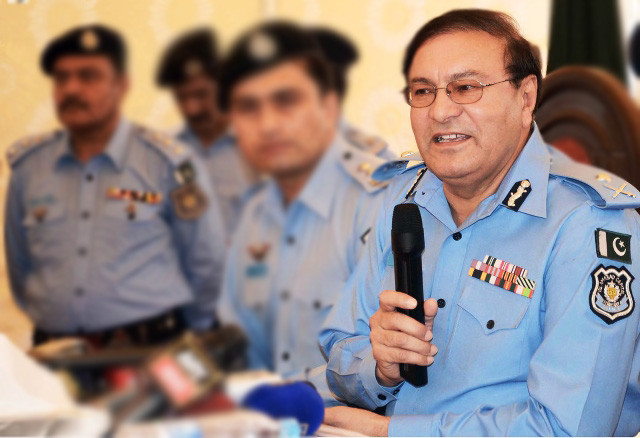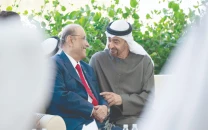The destruction of a ‘model’ police force
It took one man to destroy the model erected by the hard work of dozens of hands and brains.

ITP fell to its lowest during the tenure of IG Islamabad Bani Amin Khan. PHOTO: INP/FILE
With its inception eight years back, the Islamabad Traffic Police (ITP) introduced practices previously unknown to policing anywhere in Pakistan. These included efficiency, equal treatment for all road users, disregard for so-called VIPs and above all, honesty.
Within a year of its establishment, ITP emerged as a model for policing not only in Islamabad but other provinces as well. Despite multiple attempts at evolving new traffic police departments in the major cities of the Punjab and other provinces, however, no government managed to get to the bar set by the capital’s model traffic police.
There were factors that contributed to developing ITP’s exclusive and unique traits. Chief among them was zero-tolerance for political intervention. Unfortunately, the ITP failed to keep its pledge intact for too long.
It took one man to destroy the model erected by the hard work of dozens of hands and brains. He was the last Islamabad Inspector General of Police (IGP) Bani Amin Khan. ITP fell to its lowest during the tenure of Khan. His biggest mistake was to compromise on traffic police’s principle of no political intervention.
“Why are you after my job” had been Khan’s reply every time the ITP bosses attempted to take a stand on an incident of political influence. At all the instances where traffic police officials tried to issue tickets to so-called VIPs on violations, Khan favoured the VIPs.
During the last IGP’s tenure, at least a dozen ITP officials were humiliated and some of them even manhandled by the so-called influentials. Here again, Khan sided with the violators of law.
Consequently, the ITP officials lost morale. At one point in time, this morale fell so low that no traffic police presence could be seen at main traffic junctions which led to a traffic mess on the capital’s roads.
Recently, the Interior Ministry made an attempt to revamp the ITP and bring it back to the days of its glory but failed. Assistant Inspector General (AIG) Sultan Azam Temuri, the man credited for establishing the ITP as its first Senior Superintendent of Police (SSP), was once again given additional monitoring charge of the traffic police two months ago.
Temuri reintroduced the ‘zero-tolerance’ phenomenon. A few VIPs were fined and the ITP cops became extra-efficient for a few days but it proved short-lived. Temuri’s reforms failed to work much.
No reform was going to work until the key problem of the ITP was addressed. It was the lack of resources at the hands of SSP Traffic or Temuri himself that could be mobilised to inculcate the same level of morale in the cops which they lost under Khan.
Before Khan, both Temuri and his successor, SSP Zubair Hashmi, had established a welfare fund for ITP officials. Hashmi even introduced health insurance for officials and their families --- a first anywhere in the country.
These funds were established and sustained from the money that ITP generated from issuance of licenses. But under IGP Khan, the last government’s Public Accounts Committee (PAC), then chaired by now interior minister Chaudhry Nisar Ali Khan, deprived the ITP from this fund and stopped it from generating its own funds.
Like the regular police, ITP became dependent on the finance division for its funds. As a result, the traffic police are running on the same old fleet of patrol vehicles that it received at the time of its establishment.
Most of the ageing vehicles have gone obsolete. ITP has written to the government multiple times during the last three years but it never got funds to purchase new cars for patrolling. Only recently, three new cars were purchased but they were handed over to officers for their use.
If the government was serious in its efforts to revamp the ITP, it needs to address the first thing first — up the force’s morale.
Published in The Express Tribune, September 30th, 2013.


















COMMENTS
Comments are moderated and generally will be posted if they are on-topic and not abusive.
For more information, please see our Comments FAQ